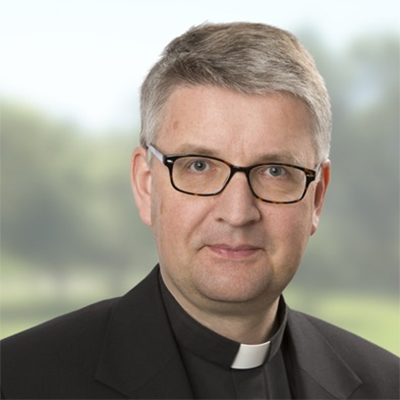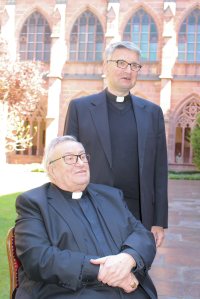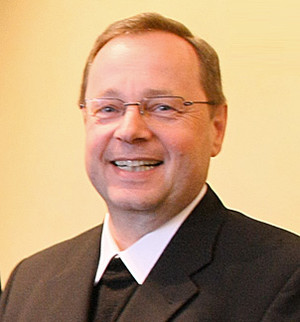Everything, including the Church, slows down over summer. As a result, there are few appointments and consecrations of bishops in August. Nonetheless, Germany gained two of them: Msgr. Peter Kohlgraf was consecrated as bishop of Mainz on 27 August and Msgr. Franz Josef Gebert became the third auxiliary bishop of Trier last Sunday.
These two consecrations fill out the roster of German bishops: there are no vacant sees or auxiliary bishop positions among the 28 (arch)dioceses in the country. This, however, is not a situation that will continue for long: Würzburg’s Bishop Friedhelm Hofmann is already 75, while Hildesheim’s Bishop Norbert Trelle reached that age today. Both dioceses can therefore expect a new bishop relatively soon (barring any exceptional circumstances, such as in the Austrian diocese of Innsbruck, which has been awaiting a new bishop since November of 2015).

^Bishop Peter Kohlgraf, flanked by Cardinal Reinhard Marx, Archbishop Stephan Burger and Cardinal Rainer Woelki, greets people gathered after his consecration.
Bishop Kohlgraf is the successor of Cardinal Karl Lehmann, who headed the Diocese of Mainz for 33 years until his retirement in May of 2016. It is a public secret that the cardinal had wanted his auxiliary Bishop Udo Markus Bentz to succeed him, but the latter’s appointment as Bishop Kohlgraf’s vicar general can be seen as a form of continuity with the Lehmann era. The previous vicar general, and diocesan administrator during the year-long sede vacante, Msgr. Dietmar Giebelmann, has been appointed as episcopal vicar for, among others, migration and integration, thus indicating some of the initial points of focus of the new bishop.
Bishop Franz Gebert was appointed to fill the position left by Bishop Helmut Dieser, who was appointed as Bishop of Aachen in September of last year. Like other German dioceses, Trier has a standard number of auxiliary bishops, in this case three, as episcopal vicars for individual pastoral areas are made bishops as a rule. Bishop Gebert headed the diocesan charity office before his appointment as auxiliary bishop, and will continue in that role as episcopal vicar for the caritas. Additionally, he will be responsible for pastoral visitation in the Trier area on behalf of Bishop Stephan Ackermann.

Bishop Franz Gebert (front row, second from right) poses with the other bishops hailing from the Diocese of Trier: front row: Leo Schwarz (auziliary bishop emeritus), Robert Brahm (auxiliary bishop), Stephan Ackermann (ordinary), Franz Gebert, Jörg Peters (uxiliary bishop), Alfred Kleinermeilert (auxiliary bishop emeritus). Back row: Helmut Dieser (bishop of Aachen), Felix Genn (bishop of Münster), Georg Bätzing (bishop of Limburg).
Photo credit: [1] Stefan Sämsmer, [2] Bistum Trier
 Almost a year after the retirement of Cardinal Karl Lehmann, all the dioceses of Germany have a bishop at the helm again – a situation that has not existed for several years. Succeeding the cardinal who led the Diocese of Mainz for 33 years is Father Peter Kohlgraf.
Almost a year after the retirement of Cardinal Karl Lehmann, all the dioceses of Germany have a bishop at the helm again – a situation that has not existed for several years. Succeeding the cardinal who led the Diocese of Mainz for 33 years is Father Peter Kohlgraf.



 The new bishop will be using the buildings, which cost an estimated 31 million euros to build and refurbish, for office space, but he will not be living there. The living spaces will be given to the use of the diocesan museum, as well as for meetings, assemblies and other exhibitions. Bishop Bätzing himself will take up residence fifteen minutes away, in a small house built in the 1950s, offered for his use by retired vicar general Franz Kaspar. While the latter had use of the house for the rest of his life, he offered his house to the new bishop on the day that Msgr. Bätzing was appointed. Fr. Kaspar, considered the former right-hand man of Bishop Tebartz-Van Elst, has stated his wish to live outside the diocese. Earlier, the house was the residence of Bishop Walther Kampe, auxiliary bishop of Limburg from 1952 to 1984.
The new bishop will be using the buildings, which cost an estimated 31 million euros to build and refurbish, for office space, but he will not be living there. The living spaces will be given to the use of the diocesan museum, as well as for meetings, assemblies and other exhibitions. Bishop Bätzing himself will take up residence fifteen minutes away, in a small house built in the 1950s, offered for his use by retired vicar general Franz Kaspar. While the latter had use of the house for the rest of his life, he offered his house to the new bishop on the day that Msgr. Bätzing was appointed. Fr. Kaspar, considered the former right-hand man of Bishop Tebartz-Van Elst, has stated his wish to live outside the diocese. Earlier, the house was the residence of Bishop Walther Kampe, auxiliary bishop of Limburg from 1952 to 1984. The other question revolves around Bishop Tebartz-Van Elst’s possible presence at the consecration of his successor. The retired bishop, who now works in the Pontifical Council for the Promotion of the New Evangelisation, has decided for himself that he will not travel to Limburg for the occasion. Bishop Bätzing will be consecrated on 18 September by Rainer Maria Cardinal Woelki, as archbishop of Cologne the metropolitan of the Church province of which Limburg is a part, with co-consecrators Bishop Manfred Grothe, auxiliary bishop of Paderborn and apostolic administrator of Limburg until the installation of the new bishop, and Bishop Stephan Ackermann, bishop of Trier, the diocese where Bishop-elect Bätzing was a priest and vicar general until his appointment to Limburg.
The other question revolves around Bishop Tebartz-Van Elst’s possible presence at the consecration of his successor. The retired bishop, who now works in the Pontifical Council for the Promotion of the New Evangelisation, has decided for himself that he will not travel to Limburg for the occasion. Bishop Bätzing will be consecrated on 18 September by Rainer Maria Cardinal Woelki, as archbishop of Cologne the metropolitan of the Church province of which Limburg is a part, with co-consecrators Bishop Manfred Grothe, auxiliary bishop of Paderborn and apostolic administrator of Limburg until the installation of the new bishop, and Bishop Stephan Ackermann, bishop of Trier, the diocese where Bishop-elect Bätzing was a priest and vicar general until his appointment to Limburg.
 The Diocese of Limburg was established in 1821 to cater to the Catholics in the then-current Duchy of Nassau, as well as the Free City of Frankfurt. Its territory was taken from the adjacent dioceses of Trier and Mainz. Originally a suffragan see of Freiburg, in 1929 it became a part of the Province of Cologne. In 1930 and 1933 it gained some more territory, from Fulda and Trier respectively. There are some 645,000 Catholics in the diocese, out of a total population of 2.4 million. It has few major cities aside from Wiesbaden and Frankfurt am Main, with the majority of Catholics concentrated in the south and northwest.
The Diocese of Limburg was established in 1821 to cater to the Catholics in the then-current Duchy of Nassau, as well as the Free City of Frankfurt. Its territory was taken from the adjacent dioceses of Trier and Mainz. Originally a suffragan see of Freiburg, in 1929 it became a part of the Province of Cologne. In 1930 and 1933 it gained some more territory, from Fulda and Trier respectively. There are some 645,000 Catholics in the diocese, out of a total population of 2.4 million. It has few major cities aside from Wiesbaden and Frankfurt am Main, with the majority of Catholics concentrated in the south and northwest. In the time during and following Pentecost, the dioceses in Northwestern Europe generally get new priests, as seminarians are ordained during this time in which the Church remembers and celebrates the Holy Spirit’s descent upon the Apostles and His continuing work in the Church today.
In the time during and following Pentecost, the dioceses in Northwestern Europe generally get new priests, as seminarians are ordained during this time in which the Church remembers and celebrates the Holy Spirit’s descent upon the Apostles and His continuing work in the Church today.
 The Diocese of Trier has come with some sort of explanation for Bishop Stephan Ackermann’s confusing comments on the Church’s moral teaching, which I wrote about before. The response comes in a response to
The Diocese of Trier has come with some sort of explanation for Bishop Stephan Ackermann’s confusing comments on the Church’s moral teaching, which I wrote about before. The response comes in a response to To me, this sounds like a classic mistake. Of course, bishops and priests (and all faithful) should do their best to find the lost sheep and bring them back to the herd. But we can’t do so by telling those sheep that they were right to get lost or purposely leaving the herd. We can’t change the truth in order to bring them back. Rather, we should show them ever more clearly the beauty of that truth, of the faith, not adapt it to what some think it should be. A bishop has the duty to shepherd and teach, but also to communicate the faith and make sure it is represented truthfully. By saying, as Bishop Ackermann did, that homosexuality is not intrinsically disordered, that contraception is not a problem because it is hard to understand, or that the indissolubility of marriage is no longer valid, he basically admits that the truth that the Church has been teaching for centuries is not set, that it can be changed according to the wishes of the people. That is not good shepherding, that is confirming people in their error, that is telling sheep to get lost and stay away because they think it is best for them.
To me, this sounds like a classic mistake. Of course, bishops and priests (and all faithful) should do their best to find the lost sheep and bring them back to the herd. But we can’t do so by telling those sheep that they were right to get lost or purposely leaving the herd. We can’t change the truth in order to bring them back. Rather, we should show them ever more clearly the beauty of that truth, of the faith, not adapt it to what some think it should be. A bishop has the duty to shepherd and teach, but also to communicate the faith and make sure it is represented truthfully. By saying, as Bishop Ackermann did, that homosexuality is not intrinsically disordered, that contraception is not a problem because it is hard to understand, or that the indissolubility of marriage is no longer valid, he basically admits that the truth that the Church has been teaching for centuries is not set, that it can be changed according to the wishes of the people. That is not good shepherding, that is confirming people in their error, that is telling sheep to get lost and stay away because they think it is best for them.